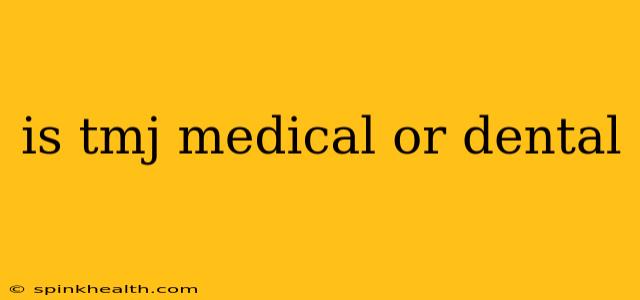Is TMJ Medical or Dental? The Complex Truth About Temporomandibular Joint Disorders
The short answer is: both. Temporomandibular joint (TMJ) disorders are a fascinating area of healthcare, blurring the lines between medical and dental expertise. It's a bit like a detective story, where the clues point in multiple directions, requiring a collaborative approach to solve the mystery of a patient's pain.
My journey into understanding TMJ began years ago, when a patient, let’s call her Sarah, walked into my dental practice, clutching her jaw in pain. Sarah's story, like many others, initially presented as a simple dental issue—toothache, perhaps a chipped tooth. But as I delved deeper, the complexities of her TMJ disorder unfolded. Her pain wasn't just confined to her teeth; it radiated across her face, down her neck, and even affected her headaches. It was clear this wasn't simply a matter of a cavity or a filling.
This is where the "medical or dental" question becomes nuanced. While dentists are the primary healthcare professionals dealing with the mechanics of the TMJ itself – the jaw joint and its surrounding muscles – the pain and associated symptoms often extend beyond the realm of dentistry.
What aspects of TMJ fall under the dental purview?
- Diagnosis of the joint itself: Dentists perform physical examinations, assess the jaw's range of motion, and identify potential issues like malocclusion (improper bite), wear and tear on teeth, or bruxism (teeth grinding).
- Treatment of dental-related causes: If a misaligned bite contributes to TMJ problems, a dentist might recommend orthodontics (braces) or a mouthguard to protect teeth and alleviate stress on the joint. Dental procedures, such as adjustments to bite, can also play a crucial role.
- Management of dental-related symptoms: Dentists manage the oral symptoms directly related to TMJ, such as pain, jaw clicking, and limited jaw movement.
What aspects of TMJ require a medical approach?
- Addressing systemic conditions: TMJ disorders can be symptoms of underlying medical conditions like arthritis, fibromyalgia, or even autoimmune diseases. A physician needs to investigate these possibilities.
- Pain management: While dentists might manage some pain associated with TMJ, severe or chronic pain often requires the intervention of a physician specializing in pain management. They might prescribe medication to reduce inflammation or manage chronic pain.
- Referral to specialists: Depending on the complexity of the case, a medical doctor might refer the patient to specialists like neurologists (for nerve-related pain), physiatrists (for physical rehabilitation), or even rheumatologists (if an autoimmune condition is suspected).
What are the common causes of TMJ disorders?
This question is often a key concern for patients. The causes are multifaceted and often interconnected:
- Trauma: A blow to the jaw or face can directly damage the TMJ.
- Arthritis: Degenerative changes in the joint, similar to osteoarthritis in other joints, can cause pain and inflammation.
- Bruxism (teeth grinding): Chronic clenching or grinding of teeth puts immense stress on the TMJ.
- Stress: Psychological stress can exacerbate TMJ symptoms by increasing muscle tension.
- Genetics: A family history of TMJ disorders can increase the risk.
- Malocclusion (poor bite): An improper bite places uneven stress on the TMJ.
How is TMJ diagnosed?
Diagnosis often involves a combination of methods:
- Physical examination: Assessing the jaw's range of motion, palpating for tenderness, and listening for clicking or popping sounds.
- Imaging studies: X-rays, CT scans, or MRI scans might be necessary to visualize the joint structure and rule out other conditions.
- Patient history: A detailed history of symptoms, pain patterns, and any relevant medical conditions is crucial.
What treatments are available for TMJ disorders?
Treatment varies greatly depending on the severity and underlying cause. Options include:
- Conservative treatments: Pain relievers, muscle relaxants, physical therapy, and stress management techniques.
- Splints or mouthguards: To help align the bite and protect teeth from grinding.
- Injections: Corticosteroids can reduce inflammation.
- Surgery: In severe cases, surgery might be necessary to correct joint problems or reduce pressure.
In conclusion, Sarah's experience, and that of countless others, highlights the collaborative nature of TMJ disorder care. It’s not simply a "medical" or "dental" issue; it requires the expertise of both healthcare professionals working together to provide comprehensive diagnosis and treatment, ensuring patients like Sarah find relief and regain their quality of life. The best approach involves a multidisciplinary team to address the intricate aspects of this condition.

